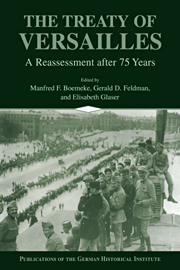Book contents
- Frontmatter
- Introduction
- Prologue: 1919-1945-1989
- PART ONE PEACE PLANNING AND THE ACTUALITIES OF THE ARMISTICE
- PART TWO THE PEACEMAKERS AND THEIR HOME FRONTS
- PART THREE THE RECONSTRUCTION OF EUROPE AND THE SETTLEMENT OF ACCOUNTS
- PART FOUR THE LEGACY AND CONSEQUENCES OF VERSAILLES
- PART FIVE ANTECEDENTS AND AFTERMATHS REFLECTIONS ON THE WAR-GUILT QUESTION AND THE SETTLEMENT
- 22 Max Weber and the Peace Treaty of Versailles
- 23 The Construction of the American Interpretation: The Pro-Treaty Version
- 24 British Revisionism
- 25 Woodrow Wilson's Image of Germany, the War-Guilt Question, and the Treaty of Versailles
- 26 A Comment
- Bibliography
- Index
23 - The Construction of the American Interpretation: The Pro-Treaty Version
from PART FIVE - ANTECEDENTS AND AFTERMATHS REFLECTIONS ON THE WAR-GUILT QUESTION AND THE SETTLEMENT
Published online by Cambridge University Press: 05 January 2013
- Frontmatter
- Introduction
- Prologue: 1919-1945-1989
- PART ONE PEACE PLANNING AND THE ACTUALITIES OF THE ARMISTICE
- PART TWO THE PEACEMAKERS AND THEIR HOME FRONTS
- PART THREE THE RECONSTRUCTION OF EUROPE AND THE SETTLEMENT OF ACCOUNTS
- PART FOUR THE LEGACY AND CONSEQUENCES OF VERSAILLES
- PART FIVE ANTECEDENTS AND AFTERMATHS REFLECTIONS ON THE WAR-GUILT QUESTION AND THE SETTLEMENT
- 22 Max Weber and the Peace Treaty of Versailles
- 23 The Construction of the American Interpretation: The Pro-Treaty Version
- 24 British Revisionism
- 25 Woodrow Wilson's Image of Germany, the War-Guilt Question, and the Treaty of Versailles
- 26 A Comment
- Bibliography
- Index
Summary
Reviewing “Ten Years of Peace Conference History” in the Journal of Modern History in 1929, Robert C. Binkley complained that American historiography of the Paris Peace Conference was formulated “around personalities on the one hand and high-sounding generalities on the other.” The result was history as morality play or melodrama in which Woodrow Wilson was pitted against Georges Clemenceau, a new shining order vied with an old hackneyed one, and a just peace struggled to prevail over a militaristic or imperialistic peace. Binkley railed particularly against a history cast in terms of heroes and villains and “against elucidating motives without understanding circumstances and coloring narratives with ethical judgments.” The requisite antidote was a history that stressed analysis, common denominators, and addressed the atmosphere of the conference in terms of social psychology.
I suppose we might congratulate ourselves on the extent to which we have been able to do precisely those things, though lest we fall into complacency we need always to keep in mind Marc Trachtenberg's 1982 admonition that the older views have remained strikingly intact and that the diplomacy of 1919 remains “over-schematized.” If that problem persists, another and perhaps even greater one may lie not so much in our growing sophistication but rather in the fact that we know too much, that the intervening tragedies have so colored our point of view that the mind set of those who sought to make peace in 1919 increasingly eludes us.
- Type
- Chapter
- Information
- The Treaty of VersaillesA Reassessment after 75 Years, pp. 547 - 564Publisher: Cambridge University PressPrint publication year: 1998
- 16
- Cited by

